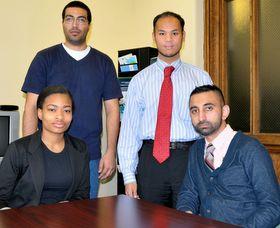
GLEY project members at CCNY [clockwise from top] Felix DeJesus, Matthew Lazo, Depak Borhara and Myasia Lyne. Mr. Borhara will discuss the civic education program that he helped conceptualize to empower young people at-risk of stop-and-frisk, at the Roosevelt Institute's Policy Expo in Washington.
Civic education program empowering young people in stop-and-frisk encounters to be presented at Roosevelt Institute Policy Expo June 28 in Washington
Walking home from school in fall 2011, Depak P. Borhara was stopped by police near his Elmhurst, Queens home. The City College of New York undergraduate's first experience with stop-and-frisk, the NYPD's contentious practice of random street interrogations, left him fearful.
"At that time I thought it weird because I'd never been stopped before. I later realized that it was a pattern for young people to be stopped, so I thought that it had to be addressed," recalled Mr. Borhara.
This Friday, June 28, the pre-law senior introduces GLEY, a civic education program that he helped conceptualize to empower young people at-risk of stop-and-frisk, at the Roosevelt Institute's 2013 Policy Expo in Washington, D.C.
Mr. Borhara's presentation to an audience of mostly students from around the country at the Pew Charitable Trusts Conference Center will mark the first step to possibly turning GLEY (Guidance for the Legal Empowerment of the Youth) into a national model.
The Roosevelt Institute is a nonprofit organization devoted to developing progressive ideas and bold leadership for America with 90 student chapters and more than 10,000 student members nationwide. Its Policy Expo demonstrates how local, student-generated policy initiatives can improve communities across the country and inject fresh, innovative policy ideas into national political discourse.
"It is a place where I can get what I am doing heard on a national level," said Mr. Borhara, a Colin Powell Center Community Engagement Fellow at City College. "Additionally, it allows me access to experts and organizations in the education field through the question and answer, and networking portions of the event."
Felix DeJesus, a junior also majoring in pre-law, will take questions on GLEY during the Q&A. He is one of three other CCNY students who helped develop the program.
Matthew Lazo, a junior pursing a double major in economics and political science in CCNY's Macaulay Honors College, and Fatjon Kaja, a pre-law junior, are the other founders. They spent 2012 with their cohorts drafting the curriculum for what is essentially a month-long program presented as weekly workshops.
Timothy Porter JD, adjunct professor of political science and a pre-law advisor, and Jennifer Light, director of the Skadden Arps Program at the CCNY and the project's advisor, vetted the curriculum.
GLEY's goal is to teach youth in areas with high rates of stop-and-frisk, their legal rights while providing them with a civics education. The latter, as taught by GLEY, focuses on the function of the three branches of government -- judiciary, legislative and executive – and how citizens can influence the branches democratically.
"I figured that if we teach young people about their rights, we should also teach them how government works and how they can effect change in government," said Mr. Borhara, currently a summer intern at the Center for American Progress in Washington.
GLEY was first conceptualized at the Harlem Youth Law & Justice Center in 2011. Under the supervision of Professor Porter, Mr. Borhara and his co-founders administered mock trials, mock city councils and moot court simulations with local high school students at the Minisink Townhouse.
Mr. Borhara then came up with the idea of taking the program to schools and teaching larger numbers of students there.
Four teachers – all CCNY undergraduates – were trained by GLEY's founders and a pilot program implemented April 2013 at the High School for Math, Science and Engineering on the City College campus.
Pleased with that, Mr. Borhara said they are now talking with a second Harlem school that has a pre-law program to add GLEY to its curriculum as an after-school program.
Stop-and-frisk has become a contentious issue in recent years. While police argue that it helps prevent crime, critics such as the New York Civil Liberties Union (NYCLU) denounce it as racial profiling and infringing on individual rights, with minorities most often targeted.
According to the NYCLU, from 2002 to 2011, African-American and Latino residents made up close to 90 percent of people stopped. About 88 percent of stops – more than 3.8 million – were of innocent New Yorkers.
On the Internet
About The City College of New York
Since 1847, The City College of New York has provided low-cost, high-quality education for New Yorkers in a wide variety of disciplines. More than 16,000 students pursue undergraduate and graduate degrees in: the College of Liberal Arts and Sciences; the Bernard and Anne Spitzer School of Architecture; the School of Education; the Grove School of Engineering, the Sophie Davis School of Biomedical Education, and the Colin L. Powell School for Civic and Global Leadership.
Set on a striking, 35-acre hilltop campus in upper Manhattan, CCNY has produced more Nobel laureates than any other public institution in the United States. The College has been touted as one of the Best Colleges in the United States as well as one of the Best Value Colleges by the Princeton Review, and ranks among U.S. News' top regional universities.